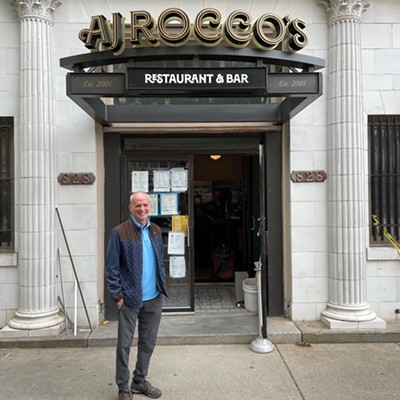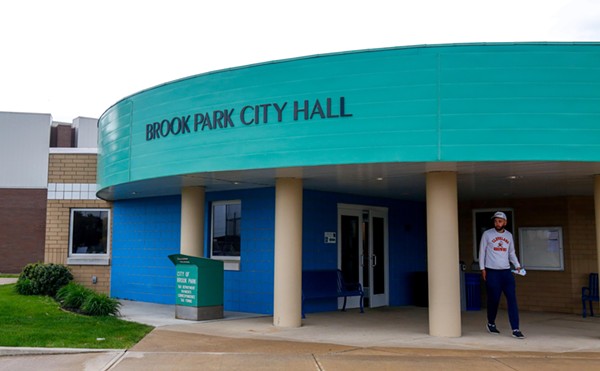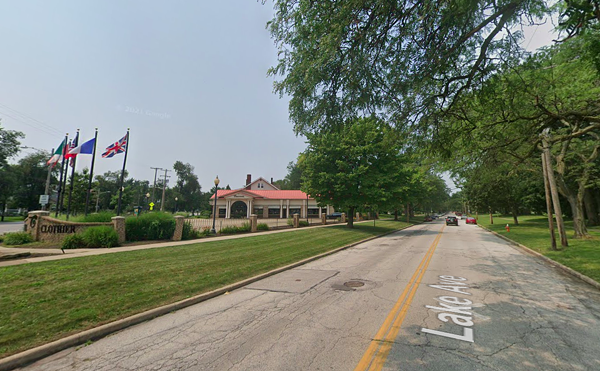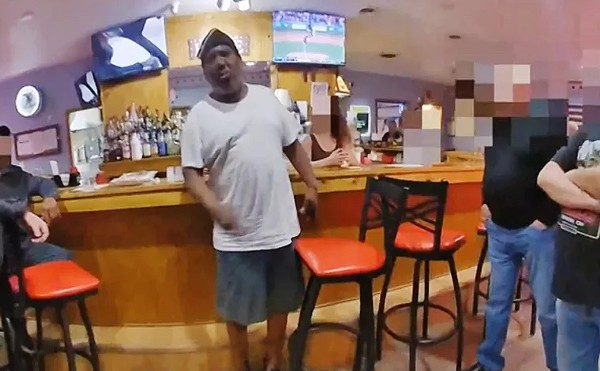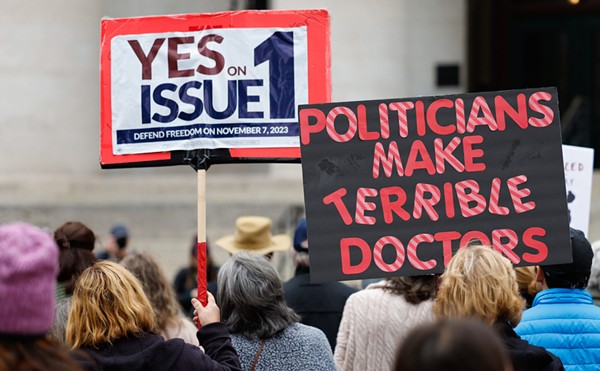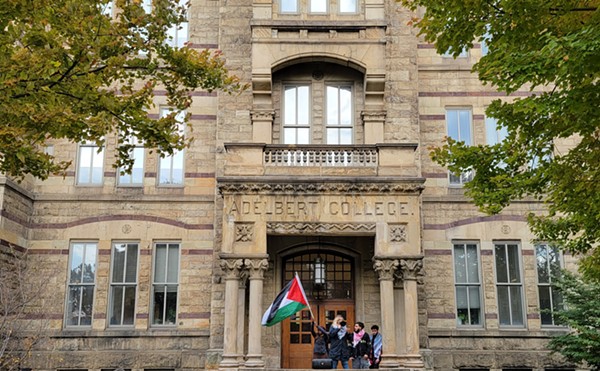Through well-scripted publicity stunts like this, Traficant became a local hero. Fearless and charismatic, he endeared himself to the city. He would rise to become the common man's congressman, his persona changing little from his sheriff days.
The same can't be said of this South Side neighborhood, which has gone from dreary to devastated. There are now many vacant lots where sturdy steelworkers' homes once lined the streets. Entire blocks sit empty between decaying buildings. Not even the liberated drug house on Willis Street remains. Only a campaign sticker on an abandoned gas station reminds visitors that this is Traficant country.
Or it was. This, too, has changed, insists Oliver, now president of Youngstown's NAACP. He tells of a community forum during Traficant's last campaign. Years ago, after delivering a speech, Traficant could have floated out of the room on his constituents' affection. But at this forum, residents complained that the congressman didn't answer their questions. Oliver wouldn't know; sick of Traficant's bluster, he left the room when the politician rose to speak.
"I don't believe you should treat serious matters like they don't mean nothing," he says, referring to the congressman's penchant for putting show before substance. "People are willing to risk selling illegal drugs, laying down and dying, [rather] than waitfor the congressman and others to do something to make our economy better."
Oliver thinks Traficant has forsaken the city's No. 1 priority -- the economy -- to tackle more entertaining causes, like defending nonconstituent John Demjanjuk, abolishing the Internal Revenue Service, and delivering off-the-cuff tirades on the House floor for the benefit of C-SPAN. It's a common criticism of Traficant. While the 17th Congressional District bled population and its politicians took money from mobsters, he lectured colleagues on The Vagina Monologues.
"Unbelievable. What is next? Rectal diaries? Men are dropping like flies in America from prostate cancer, and Broadway is promoting vaginal titillation. Beam me up."
He also cast aside his party. Despite serving a heavily Democratic district, Traficant has not so quietly turned Republican. He's voted often with the GOP on issues like gun control and immigration; last year he started voting against labor -- his biggest campaign contributor -- and opposed bills important to organizations like the NAACP. By the latter half of 2000, he was a Democrat in name only.
When it looked as if Traficant might be the tiebreaker in the House speaker vote, Republicans courted him with $26 million for a new convocation center. Traficant voted for Republican Dennis Hastert. Democrats ousted him from their caucus. He remains the only member of Congress without a committee assignment.
Voters in the 17th District suffered jokes about Traficant for years, but this particular turncoat routine puzzled them. They never thought Traficant would sell out his party for a convocation center. Not when what the Mahoning Valley really needs is jobs.
Then, on May 4, federal prosecutors slapped the congressman with a 10-count, 41-page indictment. Suddenly, Jim "I'm the son of a truck driver" Traficant was accused of peddling his influence to wealthy businessmen, compromising his integrity for swanky meals, and trading the power of his office for repairs on his boat. If the charges prove true, they would make Traficant just the sort of House "prostitute" he long accused colleagues of becoming.
Since the indictment, Traficant has lost the backing of notable business leaders. Jim Graham, president of the 4,600-strong United Auto Workers Local 1112, has called for his resignation. Editorial writers from Northeast Ohio to Washington, D.C., have trashed the congressman. His popular support has eroded as well.
Christine Rotz, owner of a suburban tanning salon, gave Traficant $300 for his last campaign. Now she's not sure she'd even vote for him. "If he were to run right now, tomorrow, I don't know what I would do. If it comes out that he's lying, then definitely he won't have our support."
Reverend Lonnie Simon, pastor emeritus at New Bethel Baptist Church, supported Traficant 20 years ago. He, too, has had a change of heart. "I think his image is hurting the community."
The congressman declined to be interviewed for this story and did not answer written questions. But it's clear that Traficant isn't just fighting federal charges; he's fighting for his political future. The indictment has fueled a movement to bring down the self-described "junkyard dog." While nearby cities have prospered, Youngstown has remained frozen in time, unable to emerge from the steel industry collapse and unwilling to transcend its culture of corruption. Regardless of Traficant's guilt or innocence, he is a symbol of the past and thus an impediment to those trying desperately to overcome their city's economic stagnation and blood-stained reputation.
"I think people are tired of the story," says Dr. William Binning, chairman of the Political Science Department at Youngstown State. "It's not only the economic story he's in, which has been a bad story, but the political corruption story. And people are just tired of all that . . . I don't think Jim's part of the future."
To outsiders, the most baffling thing about Jim Traficant is that he's managed to stay in office for 17 years. Long considered a political outsider with little respect inside the Beltway, Traficant's ability to remain Youngstown's link to Washington never fails to confound. To understand his staying power is to understand the Mahoning Valley.
Dominated by a steel industry that didn't offer much hope for professional fulfillment, Youngstown has always encouraged escapist behavior, mostly through gambling and sports. Residents revere the NFL gods from Cleveland and Pittsburgh with the same sort of devotion they show the pope. They place bets on high school football games and the roulette wheel at parish festivals. They have long memories and big hearts, especially for those facing insurmountable odds. If a politician with a modicum of name recognition ever touched them, a cousin, or a neighbor in some way, even with just a tender word or small favor, they do not soon forget.
In the 17 years Traficant has been in Congress, he's said many kind words and done many small favors. The Mahoning Valley has repaid him in spades at the voting booth.
Many Youngstown residents were descended from poor immigrant steelworkers who came from Eastern Europe, Italy, and Greece at the start of the 20th century. The social structure they found in their new home was similar to the one they left behind, only instead of patrons, the de facto dictators who ran their villages for the powers of Europe, they encountered mill owners, who controlled the jobs, the housing, and almost every other aspect of valley life.
"Divide, conquer, and give people jobs." That, says Bill Lawson, director of the Mahoning Valley Historical Society, was the strategy employed both by the mill owners and the political machine that took root. "Give them something meaningful to keep them in line."
The immigrants spent long days in the mills, followed by hours whiled away at the bar and in the gambling den. Democracy was more foreign to the valley than they were. At the mill, brokers acting on behalf of the out-of-town owners doled out jobs and settled disputes. In the after-hours joints, the Mafia ruled.
As the Youngstown rackets flourished in the 1950s, competition between mob families from Cleveland and Pittsburgh turned violent. In 1963, The Saturday Evening Post dubbed Youngstown "Crime Town U.S.A." Between 1951 and 1962, there were 75 bombings and 11 killings. Yet no one seemed to care.
"The Youngstown area exemplifies the truism that rackets cannot survive without two basic conditions -- the sanction of police and politicians and an apathetic public," wrote The Post's John Kobler. "Here those conditions have combined to produce a breakdown of the democratic process. Buffoons and incompetents succeed to important civic posts. Officials hobnob openly with criminals. Arrests of racketeers are rare, convictions rarer still, and tough sentences almost unheard-of."
As Youngstown's criminal legend grew, a working-class kid named Jim Traficant was becoming a legend on the football field. To this day, his photograph hangs in Cardinal Mooney High School's Hall of Fame, facing the well-trod courtyard where players still gather after each win to ring the victory bell.
Traficant was confident and well liked. He served on the prom court, and in the school's 1959 yearbook, classmates described him as "an all-round athlete, in all ways on the go, all-city, all-school, everything -- Jimbo!" Those looking to psychoanalyze the roguish congressman, however, usually revisit his college years.
"Jim, from what I understand, has not changed a whole lot from his quarterback days," says defense attorney and former Youngstown political boss Don Hanni Jr. "If he makes up his mind for something, he develops tunnel vision, and he's going to do it his way. That's one of the reasons he sometimes used to warm the bench for the University of Pittsburgh, despite the fact he was an excellent quarterback."
Bob Fitzer, a board member of the Citizens' League of Greater Youngstown, interviewed Traficant in 1992 for an article he wrote for a local magazine. Traficant regaled Fitzer with a story about the night before one of the biggest games of his career -- Pitt vs. Notre Dame -- when Traficant decided he'd rather judge a twist contest until 3 a.m. than get a good night's rest. When he awoke after just a few hours of sleep, he was late for the bus. The headline in that morning's paper, according to Traficant, was "Aerial duel expected, Traficant and [Daryle] Lamonica square off."
"But, evidently, the coach found out about the twist contest, because when he read the starting lineup, he says, 'Traficant was at a speakeasy at three o'clock in the morning!'" the congressman told Fitzer. "And I didn't get in the game until about the second half."
The story, Fitzer says, exemplifies Traficant's fondness for risk -- a passion that would ferment with age.
After college, Traficant became a counselor, directed a drug program, and developed into a sought-after speaker on the dangers of substance abuse. One day in 1979, he arrived at Hanni's office to announce his intention to run for sheriff.
These days, the 76-year-old Hanni is considered a profane throwback, a relic of Youngstown politics who once told 60 Minutes that all politicians took money from the mob. Hanging on the bookcase behind his desk is both a sizable crucifix and the adage: "Old age and treachery will overcome youth and skill." There are photos of him shaking hands with Presidents Truman, Carter, and Clinton, remnants of his glory days.
From 1978 to 1994, Hanni ran Mahoning County from his law office, which doubled at one time as his home and Democratic Party headquarters. Likened to Traficant in both demeanor and style, Hanni -- a.k.a. "Bull Moose" -- used to represent a steelworkers local headed by Traficant's uncle.
Hanni had previously advised the up-and-coming politician against running for county auditor versus a fellow Slav. "The first thing you learn in politics is, you never run against your own political base," Hanni says he told the young Traficant, who is half Slovak and half Italian.
Running for sheriff, however, would be fine, as long as Traficant could convince the precinct committee people to back him.
When Traficant refused to follow Hanni's instructions, "I was more than a little provoked," recalls Hanni. "And I said to Jim . . ., 'If you don't get out of that chair and get the hell out of here, I'm going to pick you up by your goddamn heels and throw you out the window.'"
Traficant ran for sheriff without Hanni's endorsement. He wasn't on his own, however. He had the support of the mob.
While campaigning for sheriff in 1979, Traficant took money from the Pittsburgh and Cleveland factions. A week after being elected in 1980, he met with Cleveland's Charles and Orland Carabbia to talk about his loyalty and how mob donations would be concealed. Unknown to him, the Carabbias taped the discussion. A month later, Charles was summoned to a Youngstown doughnut shop for a meeting. He never returned and hasn't been seen since.
During the subsequent investigation, the FBI found the secretly recorded tapes, which revealed that Traficant accepted $60,000 from the Pittsburgh faction and $103,000 from the Cleveland mob. When federal agents confronted him, Traficant confessed, then recanted. He was indicted in 1982 for accepting bribes and filing a false income tax return.
By this time, Traficant was already adored in Youngstown for his refusal to foreclose on the homes of laid-off steelworkers. On television and radio, he skewered the feds, crying conspiracy and claiming to be the victim of malicious prosecution. Traficant's message resonated with Youngstown, which was reeling from mill closings and angry with the government. He was an underdog the city could root for.
Just before his trial, a Traficant supporter introduced him to Vic Rubenstein, then an aide to incumbent Congressman Lyle Williams.
"He said, 'If we beat this thing in Cleveland, we're coming after your man,'" Rubenstein says. "I said, 'That's never going to happen, because, no offense, but the sheriff has such high negatives . . . The congressman [Traficant] pointed his right-hand finger in my chest and said, 'I'll beat him. I'll win, because there are more non-thinkers in the Mahoning Valley than there are thinkers.'"
To this day, opponents say some non-thinkers must have found their way into the jury box. At trial, the sheriff said he took the mob's money because he was orchestrating a one-man sting. Representing himself, Traficant accused the FBI of forging his confession. The jury acquitted him. Traficant emerged from U.S. District Court a folk hero.
His reputation only grew. Historian Lawson recalls witnessing Traficant speak to 2,000 people at a labor rally in the 1980s. He describes the performance as "breathtaking."
"One of his strengths as a politician is, he listens to people," Lawson says. "He's able to hear what they want and put it into words and give it back to them with his own emotion . . . He's a very forceful, imposing figure in person, and he can get angry better than most people."
In 1984, true to his prediction, Traficant won the congressional seat and headed for Washington. With the city's sole industry gone, its Murdertown reputation intact, and its political leadership controlled by the despised Hanni, Youngstown was looking for a savior.
Not long after the election, a seventh-grade social studies teacher at St. Charles School held up a newspaper with Traficant's picture on the front. She told her students they were privileged to have someone like Jim Traficant representing them in the U.S. House, someone who would make the rest of the country pay attention to Youngstown.
The savior had arrived.
Constituents often point to two federal courthouses Traficant brought to Youngstown as signs of his effectiveness. Youngstown State's Binning, a former Mahoning County Republican Party chairman, says the congressman has succeeded in serving up a good deal of pork in the past 17 years, most notably for highway projects.
Traficant's unpredictability has also worked in his favor. Because neither party could guess what side he'd take on issues, both tended to woo him whenever his vote might make a difference. That's what happened last July, after Traficant indicated that he might vote for Dennis Hastert. Republicans gave him $26 million for a new convocation center. They also supported efforts to clean up the Mahoning River, aid a local Air National Guard unit, and renovate a clinic, according to The National Journal.
Moreover, supporters say Traficant gives voice to the disenfranchised, protects their interests, and rails against oppressors like the IRS and NAFTA. That's why some believe he'll be reelected, even if his campaign is headquartered in a prison cell.
"They're getting him on some of the chintzy things like 'Well, I did some work down at his horse farm, and no, I didn't get paid for it,'" says Rocco Russo, a former fire chief and Traficant contributor. "It's just that people like to help him."
But critics argue that anyone who's been in Congress for 17 years lands goodies for his district. James Callen, a legal aide attorney and Citizens' League founder, says Traficant has limited the valley's potential. "What he's been is essentially entertainment to the outside world, and that has not been translated into service to the community."
Indeed, Traficant adapted to the capitol like a child who craves attention -- and gets it by playing the class clown. Unable to muster legislative sway, he honed his oratorical skills instead. Nothing has distinguished his tenure more than his ranting against the federal government. In his one-minute speeches and unforgettable interviews, he has creatively attacked the FBI and former Attorney General Janet Reno, accusing the former of corruption and the latter of treason and cavorting with a call girl.
Such views have made him a darling of conspiracy enthusiasts and the militia crowd. But in Washington, he's at best thought of as an oddity. At worst, he's considered a buffoon.
[Author's note: When I was 19, I worked as an unpaid intern in Traficant's Washington office, reading fawning letters from constituents, fielding their phone calls, and greeting them when they stopped by. Bored and underwhelmed, I left after just a few weeks. I later applied for an internship with the National Women's Political Caucus, a nonpartisan group that helps women win elections. But when I interviewed with the director of communications, she wasn't sure she wanted me. She held up my résumé and pointed to my listing of the Traficant internship. "If you ever want to get a job in Washington," she warned, "take that off your résumé."]
Youngstown leaders have also considered the congressman ineffective and difficult to work with. It wasn't until last year, however, that their effort to oust him gained traction.
Three candidates ran against him in the 2000 primary, including State Senator Robert Hagan, by far the strongest challenger Traficant ever faced. Hagan used the fact that the feds were back in town, winning dozens of corruption convictions, to his advantage. His sister-in-law, Kate Mulgrew, Star Trek: Voyager's Captain Janeway, filmed a commercial in which she asked voters to "beam out" their congressman.
In the past, Traficant was accustomed to winning with 75 percent landslides. This time, he won again, but with a meager 50 percent of the vote in both the primary and the general election. Still, Binning didn't realize how far Traficant had fallen until he watched a recent city council debate over plans for the new convocation center. It was a setting where Traficant had once been treated with deference. This time, council members rose against him.
"He's trying to tell them that they should give [the convocation center board] the money and let us pick the site and all this other stuff," says Binning, a Traficant appointee. "Those councilmen were right in his face. 'Don't you think you're going to tell me what to do.' You would have never seen that a couple of years ago."
Voters are also distancing themselves. "It's too much to not believe some of it," says Effie Dolas, when asked about the indictment at a church festival. Husband Jim used to defend the congressman, but no longer. "If he had kept his nose clean, he could have been governor," he says.
At Lordstown's UAW office, one retired autoworker interrupted a lively Traficant discussion. "I gave him the benefit of the doubt the first time; not this time."
Others see Traficant as a negative force in the valley, contending that he has exploited the community's anger, stifled its growth, and chased away new opportunities with his pigheadedness and polyester suits.
"He has been, in many ways, a classic demagogue," says Callen. "He's played on the fears, the suspicions, and the hatred of people. To some people, he's done what they've wanted, but I think they've shortchanged themselves and their families and their community by being content with that."
During the last election, Binning says, Traficant asked him how he thought he was doing. Binning told him to check the obituary page.
"People who really connect with Jim Traficant are dying off in the valley," he says. "My students don't get it."
Federal agents didn't descend on the Mahoning Valley six years ago to pursue its congressman -- not at first anyway. They came for Lenny Strollo, the mob boss who controlled the gambling rackets, says former Assistant U.S. Attorney James Wooley. In 1996, Strollo had a rival murdered in an alley. That Christmas Eve, a hit man acting on Strollo's orders shot a prosecutor in his kitchen. The incidents brought a new urgency to the feds' investigation. At one point, there were more FBI agents in Youngstown per capita than anywhere else in the nation.
By spring of this year, 65 people had been found guilty of federal corruption charges, including Strollo, Traficant's top aide, his former legal adviser, and the sheriff he supported. The bribery, racketeering, and other charges against Traficant could put him in prison for up to 63 years. His trial is scheduled for February.
Some have dared to envision life in the Mahoning Valley beyond the congressman. After the indictment, the normally reticent Chamber of Commerce issued a press release expressing relief.
"With the congressman's indictment, I believe we can move on to other issues at hand," wrote President Tom Humphries.
He thinks the final step is being taken toward ridding the valley of corruption. "With the congressman's recent indictment, I believe we're in the last chapter of that process. I'm very pleased that we've not allowed the door to be closed until the last is done . . . I challenge people to find corruption in this community now."
But Callen says Traficant didn't cause the valley's problems; he's only a symptom. "There are a lot of people who are claiming victory," he says. "I think that is, at best, naively optimistic. At worst, that is a continuation of the efforts to cause people to not pay attention to the problem, to inoculate them to the problem."
The problem, of course, is corruption. Over the decades, there have been several efforts to expose Youngstown's dirty dealings. In Kobler's 1963 "Crime Town" story, he noted how public appeals from civic groups and The Vindicator newspaper were met with apathy. "We're no worse than other cities," he heard residents say. Forty years later, some in Youngstown are still employing that logic.
"If he's guilty, he hasn't done anything that someone else hasn't done," says youth counselor Vera Horcoa of the Traficant charges.
The Citizens' League was founded more than 20 years ago to change such attitudes. The group has grown from five people, who met secretly on Saturday mornings, to several hundred members. But how much their efforts will translate into honest government in the long term remains to be seen. Traficant shows no sign of backing down.
Since being indicted, he has gone on the offensive. Last month, he hosted The Dan Ryan Show. On air, he berated the FBI for corruption and prosecuting innocent people. "They're a bunch of punks, pussies," he said. He even accused one agent of rape.
And he's still billing himself as Mahoning County's preeminent mob-buster. It seems to matter not that, after he was acquitted of taking bribes in 1983, a judge ordered him to pay taxes on the money four years later. As congressman, he also hired the mob's bagman and supported the public officials on its payroll.
Christine Rotz finds it difficult to explain all of this to her 11-year-old son. "It's hard. Basically, we try to tell him, if you do wrong, no matter who you are, you have to pay the price."
Seventeen years after Traficant was elected to Congress, Youngstown's children are still learning from his example. These days, it's just a different lesson.


